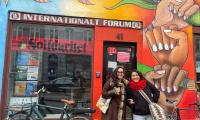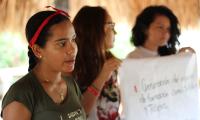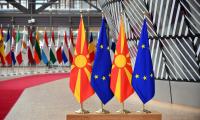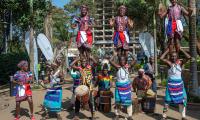Violence against women challenges democratic development in Colombia
Women and LGBTIQ+ people in Colombia are exposed to gender and political violence, including in the social movements that work towards development and inclusion. Says the organisation La Manada Feminista. The Danish Party, the Red-Green Alliance started a new partnership with La Manada Feminista to strengthen their feminist work in the country.

Angela Ocampo and Mayra Acuña in Danmark
Is violence against women a violation of human rights? It sounds like a rhetorical question. Nevertheless, it is the recognition that gender and political violence are clear violations of human rights that is the biggest challenge for the organisation La Manada Feminista, which, loosely translated, means ‘the feminist pack’.
Violence against women and LGBTIQ+ people also occurs in political parties and social movements, and it is a huge challenge for the democratic development of Colombia. Angela Ocampo, the Chairperson of La Manada Feminista, told DIPD this when we spoke to her about the organisation’s effort to strengthen women’s capacity and give them the tools to work anti-patriarchally in both political parties and social movements in the country.
Violence against women as a strategic weapon
Violence against women, girls, and LGBTIQ+ people is a major and widespread problem in Colombia. During the long-standing armed conflict, all armed actors, including the state, have used violence against women as a strategic weapon. When the then-government signed the peace agreement with FARC in 2016, many hoped that it would blaze the trail for peace and equality in the country. But sexual violence as a weapon of war continues. Not only in the most conflict-ridden areas but throughout the country.
Unfortunately, the peace agreement failed to end gender-based violence that affects women, girls, and LGBTIQ+ people in large parts of the country.
"Many acknowledge that structural patriarchal violence against women is used as a war tool in the armed conflict in Colombia. But many will not recognise that the police and the army also use sexual violence against protesters and activists, and even within the social movements and political parties, many women experience being vulnerable," says Angela Ocampo.
Human rights from a feminist perspective
La Manada Feminista is a small human rights organisation constituted by a handful of women who volunteer, all of whom have personal experiences with gender-based violence. The organisation works to support and empower women and LGBTIQ+ people, both legally and politically. They differ from other human rights organisations in the country by working from a feminist perspective.
The organisation’s main problem is that they encounter resistance in their work, as many Colombian organisations and institutions do not recognise the problem and challenges of gender and political violence against women, and especially not that it happens inside social movements.
“Even though the political left and social movements in Colombia are fighting for social change, studies show that violence against women is present and is being reproduced within these political organisations and social movements. Gender-based violence is often translated into political violence against women and is thus a huge barrier to women’s opportunities and participation in politics and parties. It is a huge hurdle for the democratic progress we want for Colombia’s democracy,” said Angela Ocampo, and continues:
“It is clear that the problems are structural, and this is extremely important since more than half of the population in Colombia are women.”
Education can prevent violence

La Manada Feminista has partnered with the Danish party the Red-Green Alliance to strengthen their work. The partnership will support the development and expansion of La Manada Feminista’s political schools for LGBTIQ+ people from political parties. The schools will educate women to both prevent and fight gender and political violence.
“The women who participate in educational courses in schools can show the way for how gender violence should be dealt with. They can help take the lead and promote the political participation of women in movements and parties.
The schools aim to reach women in southwestern Colombia. With the support of the Red-Green Alliance, La Manada Feminista has been able to further develop their tools and reach out to far more women than has previously been possible.
“There are already some of the women who have participated in our schools who are running for local elections. In this way, we strengthen not only women, but also the parties as well as the inside of democracy. We hope to strengthen the inclusion of women to stand up and take part in the parties and democracy,” says Angela Ocampo.



